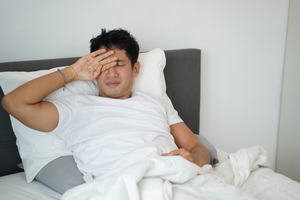
As bad as being tired all the time can be, going blind is significantly worse. Unfortunately, sleep apnea can ultimately lead to both. Not only can sleep-disordered breathing leave you feeling exhausted during the day, but recent research shows that it can potentially be connected to certain vision problems, including blindness! Below is a closer look at this relationship and what you can do about it.
What Does It Mean When You Have Sleep Apnea?
Sleep apnea is often caused by your airway being partially or fully blocked while you’re asleep. This can result in pauses in your breathing that can occur multiple times in a single night. Each pause forces your body to briefly wake up for air, which makes it very difficult to get the quality sleep you deserve.
How Can Sleep Apnea Impact Your Vision?
According to a study published in Ophthalmology, researchers in Taiwan have found that individuals with sleep apnea have a notably higher chance of also developing glaucoma. This serious eye disease can significantly damage your optic nerve, which can ultimately lead to vision loss or even blindness. The nature of the connection between sleep apnea and glaucoma isn’t completely clear, but it may be related to decreased oxygen levels in the blood that occur when breathing is interrupted.
Furthermore, there is also research indicating that patients with diabetes who suffer from sleep apnea may be more likely to develop diabetic macular edema, which causes fluid to build up in the part of the eye that lets you see fine details. Diabetic macular edema can easily lead to vision loss and eventual blindness if it isn’t addressed in time.
What Can You Do About Sleep Apnea and Related Vision Problems?
You should take whatever steps you can to get your sleep apnea under control in order to avoid more severe health issues in the long term. If you think that you may be developing vision problems as a side effect of sleep-disordered breathing, it’s a good idea to consult with your eye doctor and see what they recommend.
Sleep apnea is traditionally treated with a CPAP machine. However, some people find CPAP to be uncomfortable and awkward, so you may prefer a customized oral appliance, which can move your jaw slightly forward in order to keep your airway open while you sleep. A well-made oral appliance can significantly reduce your chances of experiencing sleep apnea episodes without the use of noisy, overly bulky equipment.
In order to protect your vision and other aspects of your health, it’s best to have sleep apnea dealt with as soon as possible. Talk to your sleep dentist to start exploring your options for treating sleep apnea long before it can lead to blindness and other issues.
About the Author
Dr. Pamela West has over three decades of dental experience, having entered the field at age 17. She studied at the University of Southern California Dental School, and she holds membership with the American Academy of Sleep Medicine, the American Board of Dental Sleep Medicine, and other organizations. Her Las Vegas practice, iSleepSolutions, offers a variety of oral appliances for treating sleep apnea. If you suspect you have sleep apnea or need treatment for sleep disordered breathing, set up an appointment with Dr. West by visiting her website or calling (702) 602-2000.
